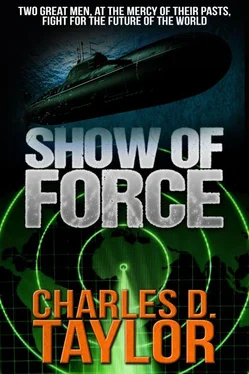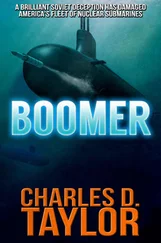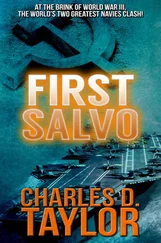As soon as the Bagley had gotten underway, Carter called him to his cabin and introduced the young ensign and the short, swarthy Cuban. They shook hands, the jungle fighter staring deeply into David's eyes, looking for that desire that so many of his small army had. Instead, he had seen a self-assurance that was uncommon among young men. There was then no understanding of the Cuban's problems, but Melendez had been told often by the C.I.A. that few Americans knew of the plans or the part the American military would take in recapturing their island 'home.
"David," Sam Carter had said, "I'm going to put you in charge of a call-fire team for Colonel Melendez." At the same time, he handed over a copy of the heavy op order that was to be their bible. "The colonel and his staff will be quartered aboard this ship until we reach our position. Their men are aboard the amphibs behind us, and they will join each other only when they get close to the beaches."
"Excuse me, Captain Carter," Melendez interrupted in only slightly accented English, "Does this young man understand what we are here for?"
"He understands only what my crew has been told since we got underway — that there will be an invasion of Cuba by a trained army of exiles, that the U.S. government is in full support, and that we will likely assist, once the invasion is underway."
"Your word 'likely' makes me nervous, Captain. All our training has been built around support from your forces. It would be senseless to appear off the coast with this armada, and then send in an army with no assistance."
"You are correct, Colonel, but I can only follow the orders I have received to date. I am assigning Ensign Charles to you because most of our other officers have been trained as a shipboard team for just the type of support I hope we can give you. He also has just come from a gunnery school with the training necessary to back you up with call fire. I think you will find him a pleasant and serious officer to work with."
Melendez found that Carter was correct. The young American was serious about his assignment, read every page of the order, asked many questions about Melendez and his army, and also became attached to the team that would go ashore.
The Cuban's hair was longer than the American sailors', and he had a thick, black moustache. His dress was casual" from the Navy's point of view, and he did not look like a military man. But David learned rapidly that his friend, Jorge, as he soon called him, was very much a fighter and a leader. He was fiercely devoted to his men, whom he missed on the amphibs. He and David spent many long hours during the day discussing the invasion plans and how the necessary support would get them from the beaches into the trees where more safety was available. They wandered in various parts of the ship, sometimes leaning on the depth-charge racks on the fantail, or stretching out on the deck by the bow, watching the flying fish leap in front of the rising and falling bow and listening to the Caribbean race by through the hawse pipes.
David developed a deep respect for the Cuban. The pride in country and the determination to liberate it were something unfamiliar to his young mind. Americans were not subject to this deep nationalism, and he was just beginning to learn it through his immersion in his military life. Jorge was willing to die on the beaches of his native land, if necessary, to bring back the world that he had grown up in. He wanted it for his wife and children in Miami, and for the many other families who also waited back in Florida not knowing where their men had gone or when they would be back. Cuba became a nation to David, home of a fiercely emotional people whom one could easily become attached to. And he was suddenly worried for them.
He had gone to the bridge the night before to talk with Carter. "Captain, is there any chance we won't help Jorge when they hit the beach? He seems to be the only one concerned. The others feel there's no problem. They're sure that Castro's army will join them within a few hours after they see us behind them."
"I wish I could answer that, David. The orders say 'yes.' Enterprise is out there now with enough firepower to take Cuba without troops. Long Beach is joining up tonight with missiles that could knock down anything Castro could put in the air. Our squadron is ready to lay down enough five-inch gunfire so they could walk up the beach a mile undisturbed, but I don't know what's going to happen." He paused for a moment, picking out a bright star in the clear sky, enjoying the tropical breeze running over his face. "The orders come from Washington."
"I know that, sir."
"We don't move a goddamn muscle until we're told to."
"Yes, sir."
Sam Carter picked out the same star again, cautiously selecting his next words. He often worked that way when he was serious, and tonight he wanted to make a point. His blue baseball cap was in his lap and the moon reflected vaguely on his bald head. Carter was one of those men who lost his hair early, and in his late thirties he had already had ten years to get used to the reddish fringe that grew around his head. It never really bothered him and at no time had he even considered the old ploy of growing it long on one side and sweeping it across his head. He was short, too, about five and a half feet tall, but that hadn't particularly bothered him either. Size wasn't important in the Navy. It hadn't seemed to concern his wife, and he had accomplished so much in his short career that most professional acquaintances probably couldn't have remembered how tall he was. His sharp, dark eyes commanded his face whether he was laughing at a party or angrily chewing out a subordinate. But he never did or said anything without thinking about it first, and he wasn't about to now.
Finally, his thoughts in order, he said, "David." Carter pushed himself upright in the bridge chair and turned to look the young man directly in the eyes. "You're now a naval officer. A lot of money has been spent on putting you through Annapolis and graduating a young man who will learn to make the right decisions in a time of crisis. Often, the decisions you make will be based on orders from Washington, from people who don't know you and don't want to know you because they might hesitate to give those orders if they did. Do you understand what I'm saying?"
"Yes, sir. You don't want me to say anything more."
Carter's eyes looked back at his, glistening in the dark night. "More than that, David. Jorge Melendez is a soldier of his country, and that's how he will act when he goes ashore. You are an American sailor, and this may be the time you'll be hurt if you don't stand back a little. I know you've gotten attached to Jorge. This is your first real combat assignment, and I want you to carry it out without the emotional concern that you're worrying about now. I like Jorge, too. He's a very brave man. I'd like to march into Havana behind him, but my place is on the bridge of the Bagley. Yours will be in a whaleboat five hundred-yards off the beach, trying to help Jorge march into Havana. But," and he pointed his finger at a place above David's head, "you must remember whom you work for." The finger turned around and pointed at his own chest. "Me."
"I understand what you're saying, Captain."
"Good. Go below to your bunk and get some sleep if you can."
David did go below, but he found Melendez in the wardroom, and he spent time drinking coffee and talking with the man about his home outside of Havana, and how much he wanted to take his family back. And then, before they both tried to sleep, they went over the plans for the hundredth time. They discussed the circuits they would use, the primary one for calling in fire, and the secondary one if they lost contact. They went over each of the words again in English that were new to Melendez, so there would be no mistaking what he wanted when he called David. Then they went to their bunks and slept fitfully.
Читать дальше












